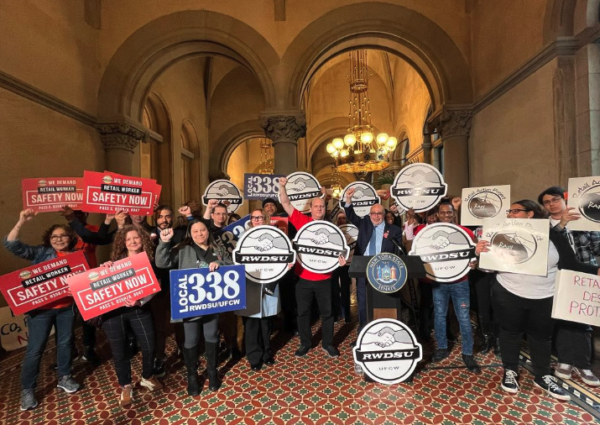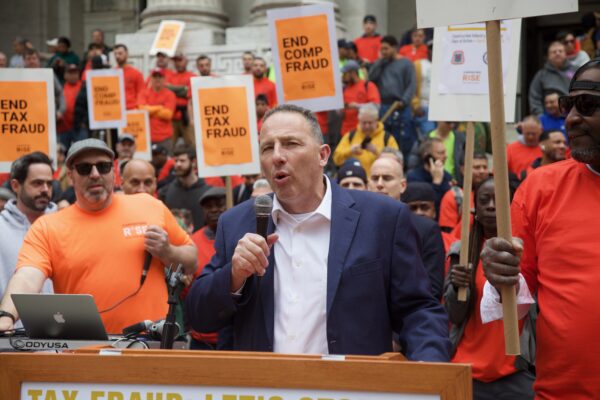January 12, 2012
Bendix Anderson, LaborPress Senior Editor
Fourteen pre-school teachers lost their jobs August 2010 after they voted to form a union. “We won an election, and three days later they were fired,” said Mike Green, organizing director for District Council 1707. That’s a clear violation of employment law. The union brought the case before the National Labor Relations Board, and nine months later Preschool of America had to give the teachers their jobs back.
It’s just another example of why the NLRB matters. But this month, the NLRB very nearly lost its ability to take action in cases like these, even when the law is clear and employers very clearly break the law.
The NLRB swore in three new members to its five-person board January 9. It wasn’t a moment too soon — the NLRB needs at least three sitting board members to perform even its most basic functions. But for the last year, Congressional Republicans blocked any new appointments to the board. So last week, Obama forced the appointments through a procedural loophole called a “recess appointment.”
NLRB Board member Craig Becker left the Board when his term ran out on January 3, the day before Obama made his three recess appointments. Without those appointments, the Board would have only had two sitting members and three empty chairs. The Supreme Court ruled in 2010 that the Board needs at least three members to conduct business or issue binding rulings.
Obama made his three “recess appointments” during the holiday — it’s one of the powers of the President to make appointments when Congress is out of session. Republicans tried to prevent this by keeping Congress “in session” with a series of very short meetings of a few Congressmen, gaveled open and closed in the deserted Capital building. Obama ignored these pro-forma sessions, effectively daring Republican to challenge his recess appointments in court.
The appointees are all familiar names — all three are lawyers experienced with the NLRB. Obama nominated two December 15, just two days before the end of a busy regular Senate session. “Neither has undergone a single confirmation hearing or a single day of debate by the representatives of the American people,” complained Senate Minority Leaders Mitch McConnell. “Congress has a constitutional duty to examine presidential nominees, a responsibility that serves as a check on executive power.”
However, Obama had nominated the third appointee in January 2010 — a full year ago. Republicans in the Senate used their 47- vote minority to block any consideration of this nominee, Terence F. Flynn, a Republican lawyer with a long history of representing management clients in labor and employment law.
Labor advocates figured that if Flynn couldn’t get a hearing from the Senate Republicans, no could. “The understanding was very clear: Instead of doing what they can’t do legislatively, repeal the National Labor Relations Act, Republicans would nullify huge portions of the Act by blocking appointments to the NLRB.” said Jeff Hauser, spokesperson for the ALF-CIO.
The NLRB is tasked with both making rules relevant to the Act and adjudicating labor disputes that fall under the Act. The five-member NLRB hasn’t been at full strength since August 2010.
Flynn will provide some reinforcements for Brian Hayes, the one sitting Republican member of the Board. Here’s clue that Flynn and Hayes share a similar point of view: Until his appointment Flynn worked for Hayes at the NLRB as Hayes’ Chief Counsel.
The other new board members include Sharon Block, a longtime Congressional staffer who served under Senator Ted Kennedy (D-Mass.) as Senior Labor and Employment Counsel for the Senate HELP Committee. Before that she served the NLRB as Senior Council to the Chairman.
Richard Griffin bring his long experience as General Counsel for International Union of Operating Engineers, a union he served since 1983. He’s also been on the board of directors for the AFL-CIO Lawyers Coordinating Committee since 1994. He also has experience on the NLRB as a counsel to board members back in the 1980s.
“President Obama’s action was hardly radical — the Board now has three Democrats and two Republicans,” said Larry Cary, an attorney with the New York law firm of Cary Kane LLP. “Of greater note is that the President appointed a union’s general counsel to the Board, which means the Board will have on it a person with real life experience.”



